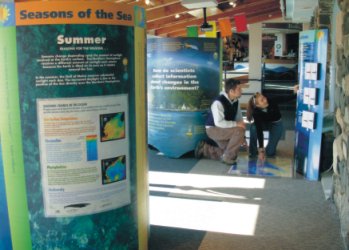
Resources
Exhibit shows Gulf of Maine ecosystem
 A new exhibit at the Seacoast Science Center in Rye, New Hampshire, gives visitors an opportunity to peer into the depths of the complex marine ecosystem of the Gulf of Maine like a scientist and learn about the underwater web of life that ebbs and flows through the entire year. "Seasons of the Sea" is a hands-on display created by the collaboration of University of New Hampshire marine scientists and Seacoast Science Center staff using National Aeronautics and Space Administration and Gulf of Maine Ocean Observing System data sources. The exhibit uses current scientific data from ocean observing tools like high-tech buoys and satellites to illustrate the year-long inner workings of the Gulf of Maine's unique character. For example, two buoys, one in the coastal zone and one far offshore in deep waters, send live data to a six-foot buoy display. Viewers can compare data from the two buoys--water temperature and salinity levels at the surface and deep below, wind speed and air temperature, current speed and direction--and put in updated information on dials that accompany the display. Informational kiosks provide details on each of the underwater seasons, and large floor maps of the Gulf of Maine orient viewers and show the locations of the dozen science and meteorological buoys that pepper the waters. The Seacoast Science Center is open from 10:00 a.m. to 5:00 p.m. Saturday through Monday. To learn more call (603)436-8043.
A new exhibit at the Seacoast Science Center in Rye, New Hampshire, gives visitors an opportunity to peer into the depths of the complex marine ecosystem of the Gulf of Maine like a scientist and learn about the underwater web of life that ebbs and flows through the entire year. "Seasons of the Sea" is a hands-on display created by the collaboration of University of New Hampshire marine scientists and Seacoast Science Center staff using National Aeronautics and Space Administration and Gulf of Maine Ocean Observing System data sources. The exhibit uses current scientific data from ocean observing tools like high-tech buoys and satellites to illustrate the year-long inner workings of the Gulf of Maine's unique character. For example, two buoys, one in the coastal zone and one far offshore in deep waters, send live data to a six-foot buoy display. Viewers can compare data from the two buoys--water temperature and salinity levels at the surface and deep below, wind speed and air temperature, current speed and direction--and put in updated information on dials that accompany the display. Informational kiosks provide details on each of the underwater seasons, and large floor maps of the Gulf of Maine orient viewers and show the locations of the dozen science and meteorological buoys that pepper the waters. The Seacoast Science Center is open from 10:00 a.m. to 5:00 p.m. Saturday through Monday. To learn more call (603)436-8043.
Oceans in peril
The Conservation Law Foundation released a booklet entitled "Oceans in Peril: Global Warming and the New England Marine Environment," in November 2006. It focuses on the perils in New England's oceans, including decades of overfishing, intensive coastal development and widespread pollution, as well as the looming threat of global warming. The booklet, through drawings and easy-to-read descriptions, discusses interactions among marine species, changes in currents and the big picture of global ocean circulation, and concludes by looking ahead at the steps New Englanders can take to help preserve their unique environment. For more information see:
Ecosystem-based management
Beginning this spring, a new email newsletter will disseminate information about scientific findings, tools, and activities that advance EBM in the Gulf of Maine. If you would like to receive the newsletter, or if you have ideas or information to share, contact Peter Taylor, Waterview Consulting
© 2007 The Gulf of Maine Times